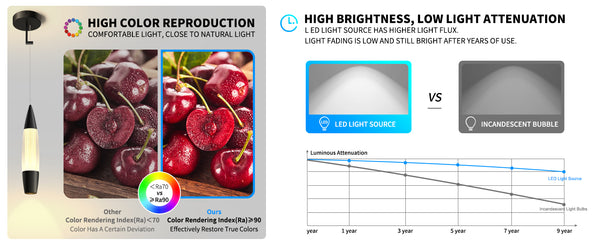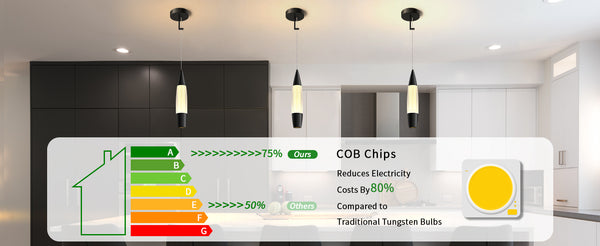US Local Warehouse
US Local Warehouse

Have you ever found yourself in the lighting aisle, silently contemplating the choice between warm and cool light bulbs? What exactly does light bulb temperature signify? Are the newer LED bulbs designed to maintain a lower temperature than the traditional incandescents? And what about the color of light bulbs? Is that only relevant for novelty and holiday lights?
The experts at okeli Lights are deeply fascinated by lighting color temperature, and we are excited to share our insights.
Continue reading for an exploration of light color temperatures and the scale utilized for measurement, along with our advice on selecting the optimal lighting color for every room in your residence.
In our discussion about warm vs. cool light bulbs, we're not referring to heat output. Nor are we delving into the color of light bulbs. Picture the color wheel from your art class—the best guide for understanding lighting color. Recall learning about primary and secondary colors? In the realm of home lighting, color temperature follows a similar pattern, with blue, green, and gray considered "cool" colors, while red, yellow, and orange are deemed "warm" colors.
So, what exactly is lighting color temperature? It's a measure of how white a lamp's light is, expressed in units called kelvins, abbreviated by the uppercase letter K following a four-digit number. Higher numbers indicate whiter, cooler light, while lower numbers signify warmer light with a yellowish cast.

We've all noticed how light affects paint color differently in a store compared to our homes. It may seem like a bait-and-switch, but it's merely the perception of paint changing color due to temperature differences, such as 5000 Kelvins in a retail shop and 3000 Kelvins in your living room.
The advantage here is that you can influence your home's entire ambiance by paying attention to how warm vs. cool light bulbs create different moods and atmospheres. Keep this concise light bulb temperature guide in mind as you rediscover how to interpret a light bulb box when selecting LEDs for your home:
A light bulb in the 2000 K to 3000 K range produces a soft, warm light with hints of yellow. This type of bulb establishes a cozy, homey feel, often ideal for entertaining and relaxing.
Between 3100 K and 4500 K, light bulb color becomes cooler and brighter, aiding tasks like reading or food prep. This lighting imparts a more energetic vibe to a room with a clear sense of clarity, devoid of yellow and blue tones.
When kelvins exceed 4600, they indicate very bright light that may take on a bluish hue. Daylight registers at around 5000 K, so anything beyond that is typically reserved for specialized tasks.

Illuminate your home with warm or cool light that suits every moment, from family meals to lively celebrations to productive WFH days to serene nights in—and everything in between. Our light bulb temperature guide demonstrates how to choose the right lights:
Create a versatile lighting combination for bathrooms, with bright, clear task lighting for grooming and a softer, warmer light source for relaxation. Dimmable LED lights offer a solution, allowing for a range of brightness levels. Opt for kelvins in the 3000-4000 range for a vibrant light bulb color on the brightest setting.
The most challenging room to light in many homes, the kitchen hosts various activities. Apply the layered lighting principle for maximum flexibility. Start with an ambient light source from the ceiling, such as sleek and sophisticated LED downlights in the neutral kelvin range of 2700 to 3500. They are dimmable, providing a vibrant look during the day and a softer glow in the evening. Add focused task lighting, like chandeliers or pendants, over the island or workstations with neutral color light bulbs. Lastly, install under-cabinet lighting to avoid deep shadows and elevate your countertops. These are also available with dimming options, creating a glowing nightlight effect overnight.
Your living room, den, family room, and other shared living spaces are where the magic happens—movie marathons, family celebrations, friendly get-togethers, and even date nights. Opt for a light bulb temperature in the 2400 K to 3000 K range to achieve a warm and welcoming vibe. These settings are perfect for showcasing your personality with unique light choices, such as LED bulbs in a retro-inspired fixture. Their filament construction has an old-school look, but these LED beauties emit a warm glow without overheating or driving up your utility bills.
Did we say the best lighting for a home office? Sorry, we meant the best lighting for your playroom-slash-home-office. When the kids no longer need a room for afterschool play but you require a space for remote work—or one room serves both purposes on different days—your lighting choices become a bit more complex. Start with the commonalities between the two purposes: a bright, neutral light bulb temperature and a combination of ambient and task lighting are essential. Opt for a nice mix of ceiling fixtures, floor lamps, and tabletop lights to complement the natural light from windows. The best color light bulb in this situation falls in the 3000-3500 K range with a clear, white cast that can enhance productivity.
For over three decades, Okeli Lighting has been dedicated to helping you save money with energy-efficient lighting while providing brilliant illumination for any setting. Now that you understand how home lighting color temperature impacts the look and feel of every room, you're prepared to discover Okeli bulbs at your preferred retailer and elevate the light color of your home.
Leave a comment